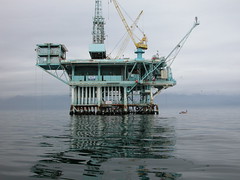 There have been a lot of discussions about the high gas prices in USA the past months and what exactly should be done to curb this trend. Some politicians, like McCain, Bush, and Gingrich, are taking advantage of the situation and tries to push for the ending of a 27-year moratorium on offshore drilling along the coastlines of USA.
There have been a lot of discussions about the high gas prices in USA the past months and what exactly should be done to curb this trend. Some politicians, like McCain, Bush, and Gingrich, are taking advantage of the situation and tries to push for the ending of a 27-year moratorium on offshore drilling along the coastlines of USA.
But offshore drilling is not a "quick fix" and it won’t help to lower the gas prices. The only ones that will profit from this are Bush and McCain’s friends in the oil industry. While people are suffering from the high gas prices the oil companies are reporting record profits after record profits.
Greenpeace has listed a bunch of reasons why offshore drilling is not the answer to high gas prices at the pump:
The only things that will lower the fuel prices, create more jobs, solve the climate crisis and fix this fragile economy is to invest in clean renewable energy sources, setting strict mpg standards for all automobiles and transform our current society to a sustainable one.
Going green will fix many problems, one of them are high gas prices.

Recommended Comments
Join the conversation
You can post now and register later. If you have an account, sign in now to post with your account.